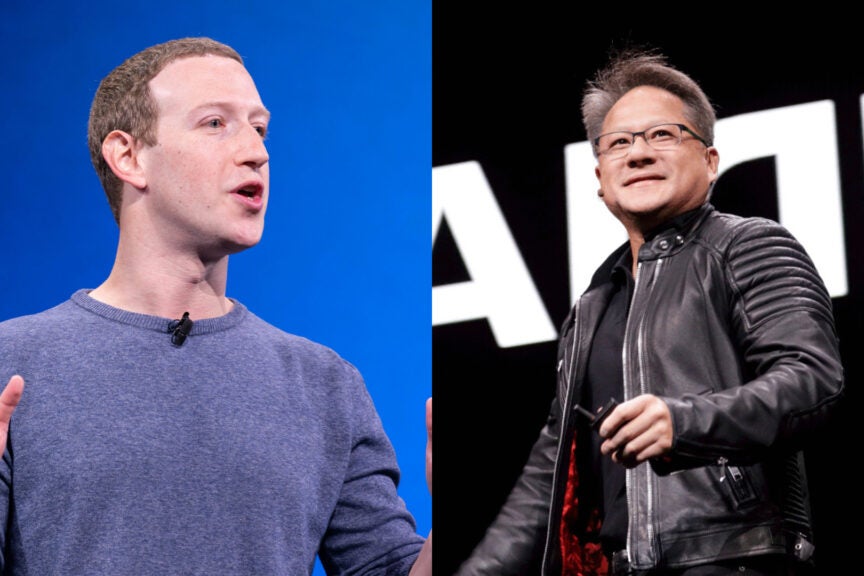In a fireside chat at SIGGRAPH 2024, NVIDIA founder and CEO Jensen Huang and Meta founder and CEO Mark Zuckerberg discussed universal AI adoption for businesses and its ubiquitous presence in every industry.
Mark Zuckerberg kicked off the conversation by unveiling AI Studio, a new platform aimed at democratizing AI creation. This tool is designed to enable users to create, share, and discover AI characters, potentially revolutionizing AI development for creators and small businesses.
Jensen Huang emphasized the inevitable integration of AI into everyday business operations, stating, “Every single restaurant, every single website will probably, in the future, have these AIs…”
Zuckerberg echoed this sentiment, adding, “…just like every business has an email address and a website and a social media account, I think, in the future, every business is going to have an AI.”
This vision aligns with NVIDIA’s latest innovations showcased at SIGGRAPH. One highlight was “James,” an interactive digital human based on the NVIDIA ACE (Avatar Cloud Engine) reference design. James, a virtual assistant capable of delivering contextually accurate responses, illustrates how businesses could deploy custom, hyperrealistic avatars for customer interactions.
The discussion also spotlighted Meta’s significant AI contributions. Huang lauded Meta’s achievements, highlighting advancements in computer vision, language models, and real-time translation. He also acknowledged the widespread adoption of PyTorch, an open-source machine learning framework developed by Meta.
Both CEOs underscored the critical role of open source in advancing AI. Meta has established itself as a leader in this realm, implementing AI across its platforms and releasing open-source models like Llama 3.1. This model, boasting 405 billion parameters, was trained on over 16,000 NVIDIA H100 GPUs, showcasing a significant investment in AI resources.
Zuckerberg envisioned a future with more integrated AI models, saying, “I kind of dream of one day like you can almost imagine all of Facebook or Instagram being like a single AI model that has unified all these different content types and systems together.” He emphasized the importance of collaboration in driving further AI advancements.
The conversation also touched on AI’s potential to boost human productivity. Huang described a future where AI could generate images in real-time as users type, facilitating seamless collaboration between humans and AI assistants. This vision is reflected in NVIDIA’s latest enhancements to the NVIDIA Maxine AI platform, including Maxine 3D and Audio2Face-2D, aimed at creating immersive telepresence experiences.
Looking ahead, Zuckerberg expressed excitement about integrating AI with augmented reality eyewear, referencing Meta’s collaboration with Luxottica. He anticipates this technology transforming sectors like education, entertainment, and work.
Huang discussed the evolving nature of AI interactions, moving from simple, turn-based conversations to complex, multi-option simulations. “Today’s AI is kind of turn-based. You say something, it says something back to you,” Huang explained. “In the future, AI could contemplate multiple options, or come up with a tree of options and simulate outcomes, making it much more powerful.”
The relevance of these advancements is evident in the adoption of NVIDIA’s technologies across various industries. Companies like HTC, Looking Glass, Reply, and UneeQ are leveraging NVIDIA ACE and Maxine for applications ranging from customer service agents to immersive telepresence experiences in entertainment, retail, and hospitality.
As AI continues to evolve and integrate into diverse aspects of our lives, the insights shared by Huang and Zuckerberg offer a glimpse into a future where AI assistants are as ubiquitous as websites and social media accounts.
The innovations presented at SIGGRAPH 2024 by NVIDIA and other companies highlight that this future is swiftly approaching, with digital humans becoming increasingly sophisticated and capable of natural, engaging interactions.
Author Bio:
Sarah Wilson – Author and Content Writer at AiBlock Insider

[…] Meta and Google have yet to respond to requests for comments, while Microsoft has declined to add any further statements. This delay in the Nvidia AI chip production could potentially hinder the technological advancements and operational efficiencies anticipated by these tech giants. […]